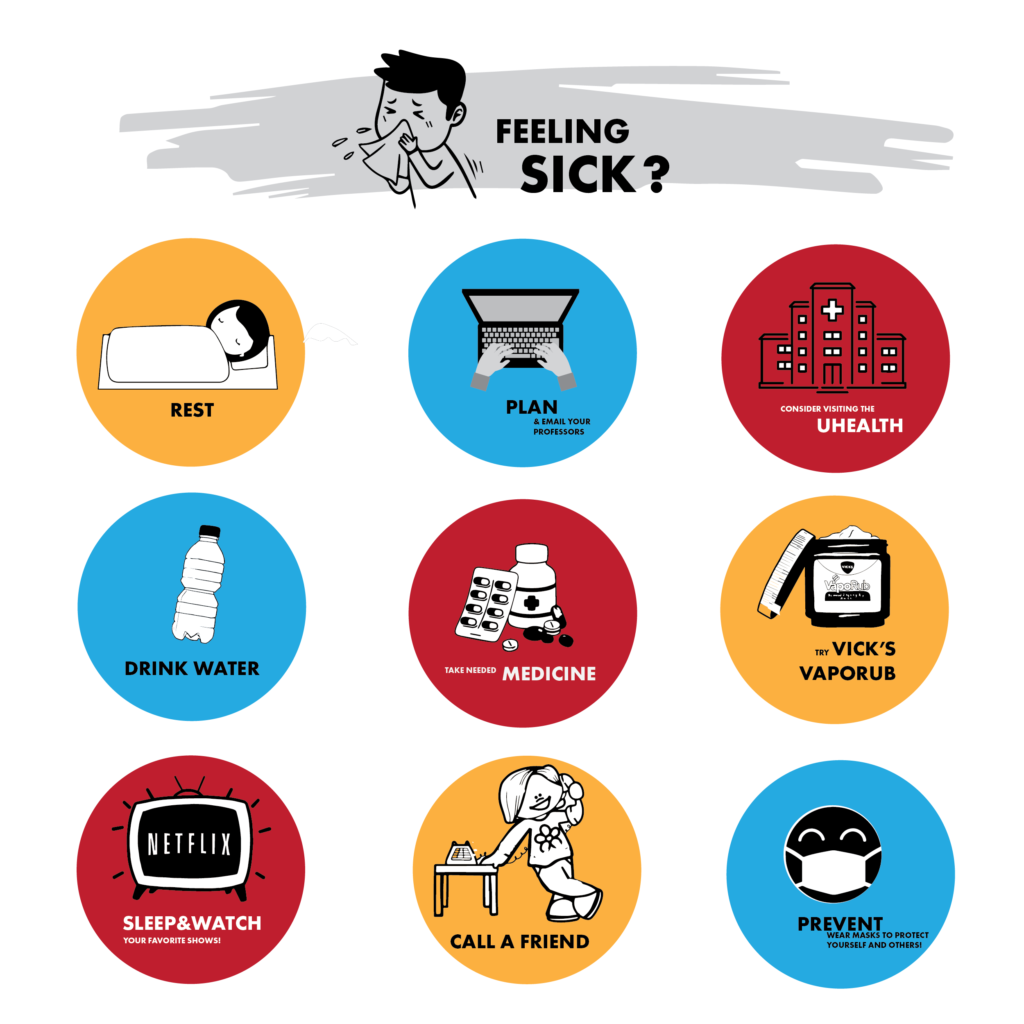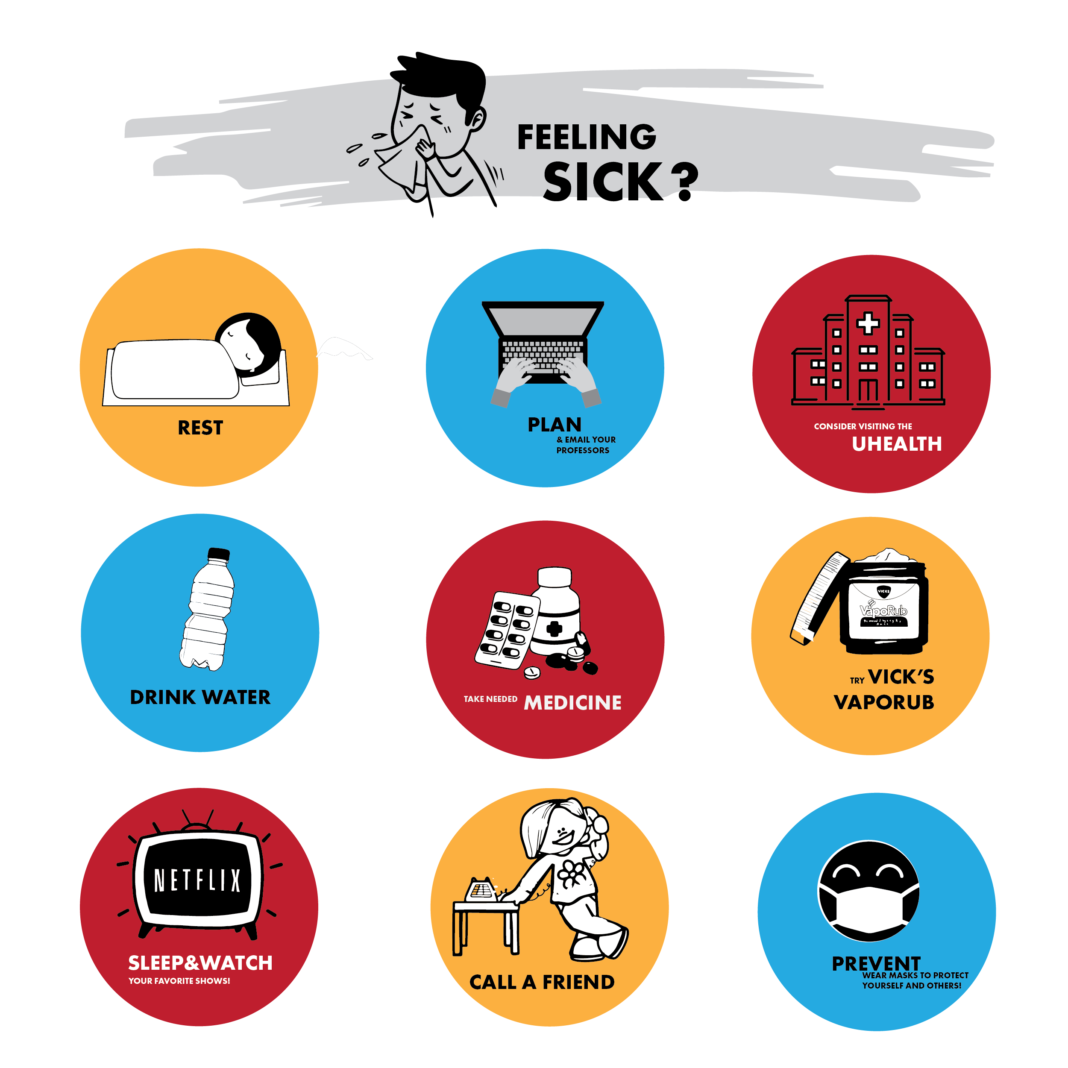
As college students, we’re no strangers to the infamous frat flu and the annual semester sickness, but what do you do when you’re miles away from home and mom can’t make you her miracle chicken soup?
Here is a step-by-step guide on what to do when you’re sick in college.
1. Be honest. Can you really go to class right now?
Your health should be your top priority. According to the CDC, Rhinoviruses, or the common cold, are spread by simply coughing or sneezing. By staying home to get some rest, you protect yourself and others as well.
Allowing yourself one day of rest could restore the strength you need to continue your daily activities. Don’t ignore your body’s need to rest — resting allows your body to put energy into healing instead of fighting the illness. The CDC says, “Most rhinovirus infections are mild, but they can cause severe illness, especially in people with weakened immune systems, asthma, or other underlying medical conditions.” Your body works hard on a daily basis, you owe it to yourself to care for your health.
2. Don’t panic. Plan.
If you feel overwhelmed with your responsibilities, make a list of everything you will miss out on while recovering. Email your professors to let them know you’ll miss class and reach out to classmates for notes and important information.
Read the syllabus. Most professors include an absentee protocol to follow.
3. On a scale from 1 to Student Health Center visit, how bad is it?
Assess your symptoms. Movement can help alleviate symptoms like congestion and fatigue but don’t exert yourself or do more than you can handle, as your body is in a fragile state.
If you don’t notice your symptoms subsiding after a few days of rest and self-care, use your resources! Consider scheduling an appointment at the Student Health Center at https://umiamihealth.org/en/myuhealthchart.
4. Hydration. We know — unheard of for college students.
No, energy drinks and overpriced Starbucks lattes don’t count as hydration.
Drinking liquids can help you replenish the fluids you’ve lost while releasing mucus and can help balance the temperature in your body if you have a fever. Water is fine, but also consider drinking something with electrolytes like Gatorade or Emergen-C, which contains vitamins for energy and immune support. Liquid IV drink mix is also a great option for electrolytes and extra hydration.
Other fluids, like tea and soup, can have benefits other than hydration. The classic hot tea, lemon and honey combo can soothe a sore throat and you can never go wrong with soup — chicken or bone broth can help your immune system fight the common cold.
5. Manifesting won’t help you now, darling — take some medicine.
You do not have to leave campus to stock up your medicine cabinet. The Market next to the Hurricanes Food Court sells a variety of over-the-counter options, and the Walgreens inside Student Health holds an even larger selection of products for your sick needs.
Another option is the Pharmabox vending machine in the Merrick Building.
If your temperature matches the 100-degree Miami weather, take Tylenol for your fever. Medicine with ibuprofen like Advil can help relieve pain and inflammation. If congestion is making your voice sound like a bad impression of Kermit the Frog, decongestants like Mucinex D or Afrin nasal spray work well.
As you hear in the commercials, consult with your primary care provider if these medications are safe for you to take.
6. Vicks VapoRub. Enough said.
Your abuela’s secret weapon is no joke. This ancient legend is not just chisme. The substance is a miracle cure for the common cold.
Vicks VapoRub is a topical cough suppressant that you can rub on your chest, throat and even under your nose to relieve common cold symptoms and minor body aches.
7. You have a valid excuse to oversleep and binge-watch shows.
This is a perfect chance to catch up on the sleep you lost during those midterm all-nighters. Greg Richter writes for UPenn Medicine News, “During sickness, cells are under stress, and organisms experience sleepiness to promote sleep and recover from the cellular stress.” Being sick exhausts your body, so a long nap might be your best medicine.
When you find yourself in between naps, capitalize on the opportunity to go through your watchlist and cross off those movies you told your film major friend you would watch but never did. For a binge-watching session, tune into shows like “Gilmore Girls” or “Seinfeld” on Netflix, which are easy to follow and full of the best medicine: laughter.
8. “Mom, I’m sick and lonely.”
Being sick and alone in your dorm room is not fun, so call a friend or family member to take your mind off of how awful you feel. Who knows? They might bring you a freebie from the pop-up giveaway that conveniently appeared on campus the second you fell ill.
A quick conversation with a loved one can lift your spirits, and an improved mood can speed up the recovery process.
9. Prepare for next time.
It’s time you become the health authority for both you and your roommates. You can’t survive on two sips of water and two-ounce bags of Doritos forever. Your body will respond eventually, so put these preventive measures in place to combat the inevitable.
No more empty medicine drawers — stock them with the aforementioned over-the-counter remedies, herbal tea and cough drops. Carry around hand sanitizer and wash your hands often, not just when you use the bathroom. Basic hygiene goes a long way.
Consider purchasing an air purifier. Communal living means sharing not only a space but air and bacteria with other people. The Levoit Core 300 or a Blueair by HERPA are high-quality options that are compact, perfect for the limited space you have in a college dorm.
Consider wearing a mask or face covering if you have a lingering cough or start to feel under the weather. The CDC says this is useful “for example, in household settings when someone is sick or in crowded indoor settings such as public transportation when respiratory disease activity is high in your community.” It’s a great way to keep yourself healthy and care for your fellow ‘Canes.







